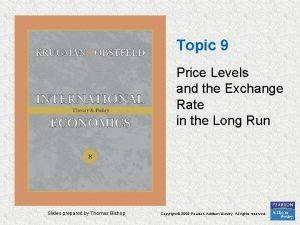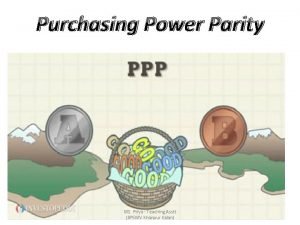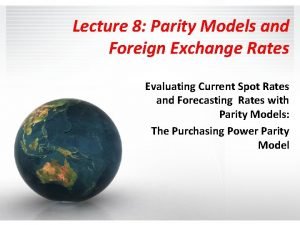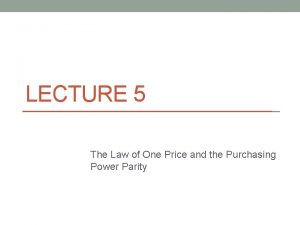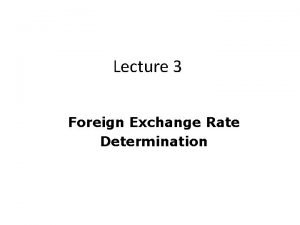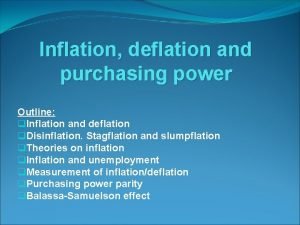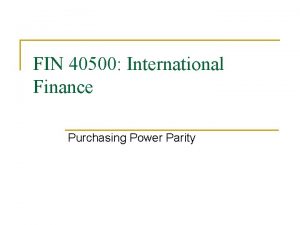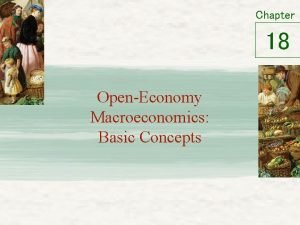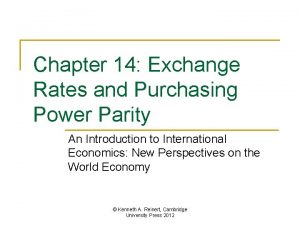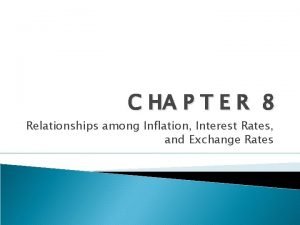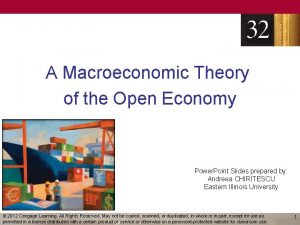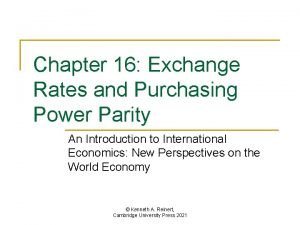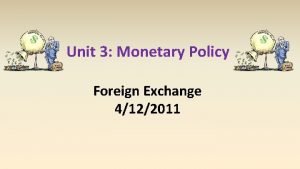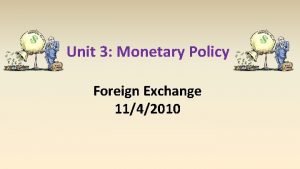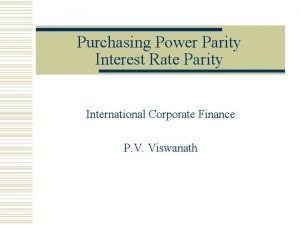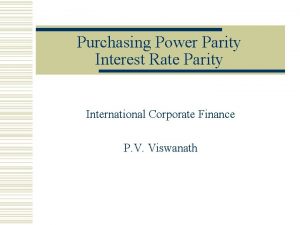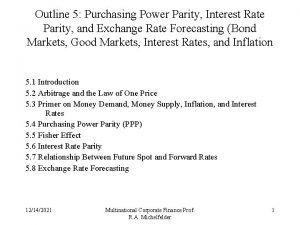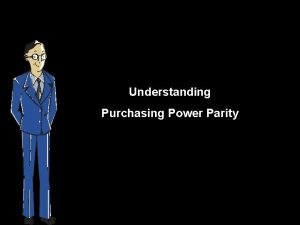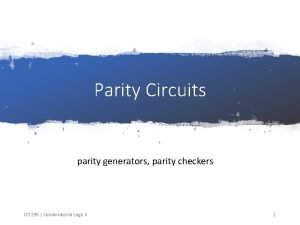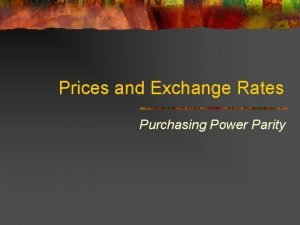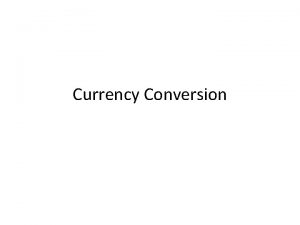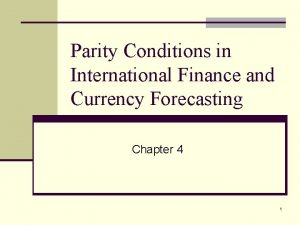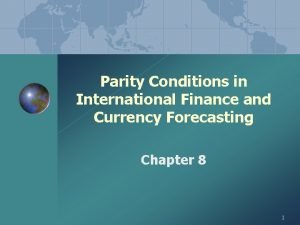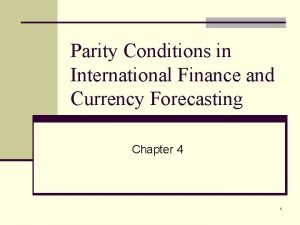Purchasing Power Parity Akshay Sawant MMS Finance Currency













- Slides: 13

Purchasing Power Parity Akshay Sawant MMS Finance

Currency Basics � 55 Rs/$ 52 Rs/$ Rupee Appreciated & Dollar Depreciated �Dollar depreciated by (52/55)-1 i. e. 5. 4 % �Rupee appreciated by [ (1/52)/(1/55) ] – 1 i. e. (0. 01923)/(0. 01818) – 1 = 5. 769 %

Law of One Price � The law of one price says that the same good in different competitive markets must sell for the same price, when transportation costs and barriers between markets are not important.

Purchasing Power Parity � Japan cheapest, UK most expensive � Yen is undervalued, Pound overvalued COUNTRY LOCAL CURRENCY EXCHANGE RATE (US) US$ VALUE $29. 99 US $ 29. 99 Japan ¥ 2500 $1 = ¥ 114. 57 2500/114. 57 = $21. 82 £ 25 $1 = £ 0. 5591 25/. 5591 = $44. 72 UK

Absolute Purchasing Power Parity � The exchange rate between two countries will be identical to the ratio of the price levels for those two countries. E (Rs/$) = P (Rs) / P ($) � EG Price of a product in India = 250 Rs Price of same product in US = 5 $ Thus E (Rs/$) = 250/5 = 50 Rs/$

� The following conditions must be met for this relationship to be true: 1. The goods of each country must be freely tradable on the international market. 2. The price index for each of the two countries must be comprised of the same basket of goods. 3. All of the prices need to be indexed to the same year.

Relative Purchasing Power Parity Relative purchasing power parity relates the change in two countries' expected inflation rates to the change in their exchange rates. E(N) = E(0) (DC/FC) (1 + IDC) / (1 + IFC) Where, E(0) is the spot exchange rate at the beginning of the time period. E(N) is the spot exchange rate at the end of the N years. IFC is the expected annualized inflation rate foreign country. IDC is the expected annualized inflation rate for domestic country.

Example �E(0) = 55 Rupees per dollar. �Consider annual inflation rate for the U. S. to be 1. 4 % �The annual expected Indian inflation rate is 6. 87 % Ø E(0) = 55 Rs per dollar. (1 + IFC) = 1. 014 (1 + IDC) = 1. 0687. Ø S 1 = (1. 0687) / (1. 014) × 55 = 57. 9669 Rupees per $

Basket Example PRODUCTS USA IN $ INDIA RUPEE/DOLLAR Coke, Pepsi 1 20 20 Candy bars & chocolates- snickers, 1 20 20 1 tin of frozen yogurt( 2 tins from Wal-Mart) 1 15 15 1 small packet of lays 1 10 10 500 ml purified water 1 10 10 20 -30 strips of chewing gum 1 20 20 PPP Conversion factor 15. 83

Big Mac Index �Introduced in The Economist in September 1986 by Pam Woodall �Informal way of measuring the Purchasing Power Parity (PPP) between two currencies �Big Mac was chosen because it is available to a common specification in many countries around the world

Contd… �Big Mac PPP exchange rate between two countries is obtained by dividing the price of a Big Mac in one country by the price of a Big Mac in another country. �This value is then compared with the actual exchange rate; if it is lower, then the first currency is under-valued compared with the second, and conversely, if it is higher, then the first currency is over-valued.

Arbitrage Opportunities � 1$ = 55 Rs �Big Mac price in US 4. 33 $. . . So price in India should be 238 Rs �But in India Price is 89 Rs �Thus PPP exchange rate is 20. 57 (89/4. 33) �Indians would produce in India and sell in US for the arbitrage opportunity �Thus Rupee will appreciate

THANK YOU
 Purchasing power formula
Purchasing power formula Priya orice
Priya orice Purchasing power parity meaning
Purchasing power parity meaning Law of one price and purchasing power parity
Law of one price and purchasing power parity Interest rate parity
Interest rate parity Relative purchasing power parity
Relative purchasing power parity Calculating purchasing power parity
Calculating purchasing power parity Purchasing power parity theory
Purchasing power parity theory How to calculate purchasing power parity
How to calculate purchasing power parity Fisher effect equation
Fisher effect equation How to calculate purchasing power parity
How to calculate purchasing power parity Exchange rate equation
Exchange rate equation What is purchasing power parity
What is purchasing power parity Purchasing power parity
Purchasing power parity
